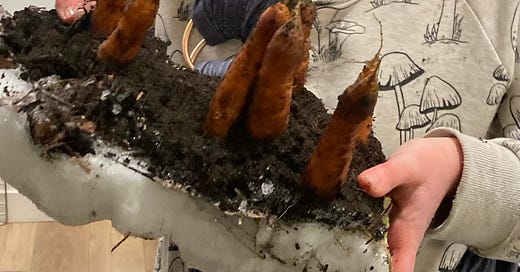Last night my daughter-in-law in Oregon texted this photo. She’s a devoted gardener, even in current ice storm conditions. Here she is presenting a large plug of ice from one of their raised garden beds. The ice is attached to a thin layer of soil, connected to seven carrots. Ice on bottom, carrot tips on top, like some kind of cheery cartoon sculpture. I was thinking about that picture as I fell asleep.
I woke this morning to read Austin Kleon’s newsletter, revealing garden metaphors that illustrate truth about creativity.
He says, “I collect gardening metaphors because the lessons of gardening are basically the opposite of the messages we receive from our controlling, technocratic, perfectionist, algorithmic, optimizing status quo,” whose restrictive qualities are like pesticide to invention.
I agree. In fact, I’ve been thinking old journals are like winter gardens. My daughter-in-law needed carrots for the soup she was making last night. She went out to her frozen garden and harvested the carrots in the picture above, adding them to the pot of other ingredients. (I imagine chicken stock, onions, celery.) After a certain amount of stirring and tasting and waiting, voila—soup!
Her planting bed is like my shelf of old journals, many-colored moleskins, some covers decorated with doodles or stickers, some plain as Kraft paper-wrapped packages.
As much as I love journaling, I’ve struggled to keep up the practice for the year and a half since my mother passed. I stopped my daily habit back then in favor of just being there in person with family during hospice and the hours and days and months and year after. I didn’t successfully pick up my journaling again until recently.
I’ve really missed it. Of course that’s partly because journaling is both a meaningful way to release anxiety and a safe place to explore my thoughts.
But also, that shelf of old journals is like an ice-covered garden. If I dig a little in a place where I planted something long ago, I may find a surprising idea to toss in the pot, to add a savory flavor or flash of color.
When I go back to reread my old journals, I do find a lot that’s unusable. But I also find lines I care about, just under the surface. If I pull one out like a carrot, wipe it off, and type it at the top of a new page, it often evolves into something meaningful and interesting. At least to me.
I’ve found many of my old journal pages full of family history. I edited some of those pages into the first chapter of my first novel, Copy Boy. I wouldn’t have written that book, wouldn’t have written any of my books, without those old journals and the carrots buried within, hidden under a hardened top layer.
I’m so pleased at the chance to chat with debut novelist Jill Apsit Fordyce about her novel BELONGING (available January 31), Sunday, February 18, from 1-2 pm, at Ruby’s Books in Folsom.
Jill and I went to high school together in Bakersfield. A former attorney, Jill has worked for a long time to bring her story to fruition. She’s a talented and lovely person you’ll want to learn more about.
Jill says her novel, Belonging, is about the events that transform our lives: the innocence and heartache of your first love, the confusion and sadness of a cherished friendship slipping away, the way we are all shaped by the places we come from, and the fierce desire to make a family when your own family has failed.
Jenny is thirteen when an epic dust storm rolls into her central California town in December 1977. Bedridden after contracting a life-threatening illness in the storm and suffering a shocking loss, Jenny realizes she will never be cared for by the mother who both neglects and terrifies her or the father who allows it. She relies on her cousin, Heather, who has the loving home Jenny longs for; her beloved great-uncle, Gino, the last link between generations; her best friend, Henry, a free spirit with whom she shares an inexplicable bond; and earnest baseball star, Billy, who becomes her first love. After a stunning turn of events in both their lives, Jenny and Henry leave for college in LA together in the summer of 1982—Jenny fleeing a broken heart, and Henry running from something he can’t reveal, even to his best friend. When she returns home years later, the life Jenny so carefully created collides with the one she left behind.
Spanning three decades, Belonging is about first love and heartbreak, friendship and secrets, family and forgiveness, hometowns and coming of age, and memory and music. The heart of the story is Jenny’s struggle to undo the binds of a childhood that have deeply affected her life, the painful path to love endured by children raised in alcoholic families, and the grim reality of believing you must hide a part of yourself in order to belong.
I hope you’ll join Jill and me at a great indie bookstore to learn more about a fascinating new book and author.
Until next time,
Shelley






This makes me glad for many reasons. Harvesting those carrots, you journaling again, and you appearing at Ruby’s Books.
I really enjoyed reading this Shelley. I just talked to my son in Portland today and they are navigating the unusual cold in Oregon also; I'm not sure if you are aware, but my husband Karl died in May after a very brief illness. I started exploring some writing again for the first time last week. It felt exhilarating but it also kicked up some very raw feelings and I have had to take a break. I think of the old writing workshops with Kate Asche with great fondness and think of you often. Your success has been a great inspiration to me.